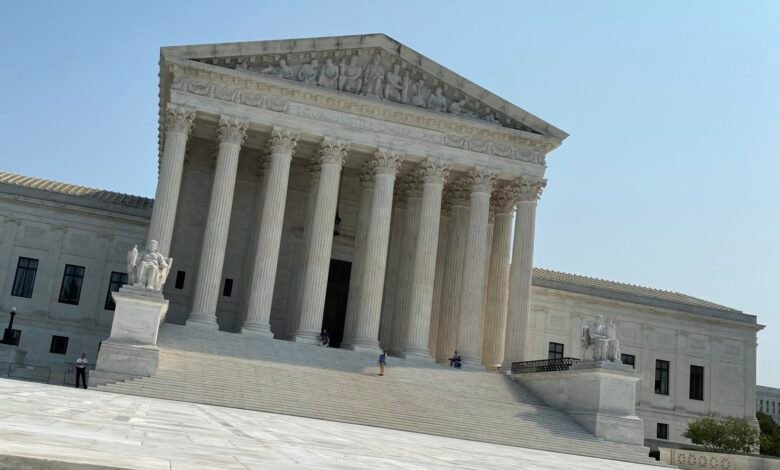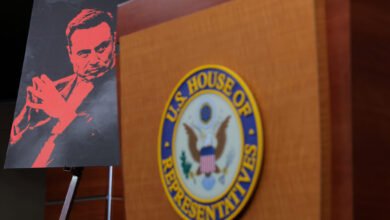The Supreme Court won’t save the country so it looks like Nevada will have to • Nevada Current

“Institutions will not save you.” That was the third rule listed in an eminent essay published by Russian-American journalist Masha Gessen shortly after the 2016 election, “Autocracy: Rules for Survival.”
The rule’s validity is being powerfully telegraphed lately by the U.S. Supreme Court.
Several constitutional scholars, some of them notable conservatives, strenuously supported the Colorado case disqualifying Trump from that state’s ballot because he’s an insurrectionist.
But Monday’s ruling by the highest court in the land keeping Trump on the Colorado ballot was no surprise. There was never any chance of justices tossing Trump from a ballot in Colorado or anywhere else. Doing so might have seemed radical. And the only radicalism accepted and normalized in U.S. politics these days is radicalism in aid of Trump and Trumpism.
Meanwhile, last week in a separate case, the court said it wouldn’t hear Trump’s claim of immunity – his argument that laws made by mere mortals do not apply to him – until April 22.
While many scholars thought the Colorado case was sound, something approaching a critical mass of the entire legal community, including a federal judge and a U.S. court of appeals, has found Trump’s immunity claim utterly daft and/or constitutionally obscene.
The Supreme Court should have just said it was declining to hear the case and let the appeals court ruling, i.e., Trump is not immune, stand. And it should have done so when the appeals decision was made a month ago.
Even the Trump sycophants on the court may ultimately balk at declaring him an exalted supreme leader exempt from any and all criminal laws.
But the supine court is already aiding and abetting him in the immunity case. It won’t even hear oral arguments on it for several weeks. A ruling might not come until the end of June.
All the while, Trump’s trial on his January 6 indictments, which had been scheduled to start this week, continues to be delayed. And the Supreme Court knows it. That’s the point of their dawdling.
Trump will inevitably make additional arguments designed only to delay, his plan being to stave off a trial until after he’s inaugurated when he can order the U.S. Justice Department to drop all its charges against him and turn its attention to persecuting people who have displeased him. However specious Trump’s additional delay tactics, they will almost certainly be met with more high court foot-dragging.
Maybe the justices should face their own January 6 indictments for being accessories after the fact.
Some say that if Trump wins the 2024 election, the concerns about him implementing autocratic rule are overblown, because, for one thing, the judicial system is independent and will hold him in check.
An independent judicial system likely to hold him in check wouldn’t be deliberately making in-kind contributions to Trump’s campaign by needlessly delaying his trial.
But let’s imagine, for the sake of argument, that the Supreme Court would muster the spine to stand up to lawless edicts decreed by a newly inaugurated President Trump. Why wouldn’t Trump just ignore the court?
When Trump occupied the White House he had, at the urging of reactionary extremist Steve Bannon, hung a painting of Andrew Jackson in the Oval Office.
Jackson might have not only agreed with, but approved of Gessen’s assessment that institutions won’t save us.
When the Supreme Court under Chief Justice John Marshall ruled against the state of Georgia’s unconstitutional seizure of Cherokee land in the 1830s, Jackson said “John Marshall has made his decision; now let him enforce it.” And then, in brazen disregard for the Supreme Court of the United States and the U.S. Constitution, Jackson sent federal troops to help Georgia push Cherokees into a deadly forced march to Oklahoma.
Trump thinks he is one of the greatest leaders in world history, and certainly the greatest leader in the history of the United States – greater, even, than Andrew Jackson. If reinstalled in the White House, Trump, who has vowed to be the retribution president, is not going to allow himself to be obstructed by judges – mere mortals after all – who have already, whether through fear or fealty or a combination of both, demonstrated their submission to Trump and Trumpism.
So it’s up to … Nevada?
Congress may be able to slow the nation’s march to autocracy. But only if Democrats control one, and preferably both, houses.
If not, well, Republicans in Congress have already demonstrated they believe their obligation to Trump consists first and foremost of obediently carrying out his commands.
Which leaves the U.S. with one path to salvation: Democracy.
We the people, to borrow a phrase, are the last line of defense against imposition of an authoritarianism from which the best of the nation’s founding principles may never recover.
Due to less impressive features of the nation’s founding – specifically the egregiously anti-democratic electoral college system for selecting presidents even when they lose the popular vote – Nevada is one of only a handful of states where voters will decide the presidency.
It’s a historical quirk, really, a product of an archaic political expediency that is well beyond its sell-by date. Like the other battleground states – Arizona, Wisconsin, Michigan, Pennsylvania, and Georgia – Nevada has no business having such outsized importance to the survival of democracy not only in America, but likely beyond if American democracy falls. It’s illogical, even perverse.
But institutions won’t save us, so voters in Nevada and those other five states will have to.
It’s not fair.
It shouldn’t fall on Nevadans.
But it does.
History will record that Joe Biden was old, that prices were higher than they had been, and that international migration driven by decades of economic, industrial, and military policies in developed and powerful nations unnerved populations in those same nations.
But the course of United States history in the latter three-fourths of the 21st century may be determined, implausible though it may seem, by an ostensibly rather mundane factor: Who Nevadans voted for in 2024.
Portions of this column were originally published in the Daily Current newsletter, which is free, and which you can subscribe to here.




